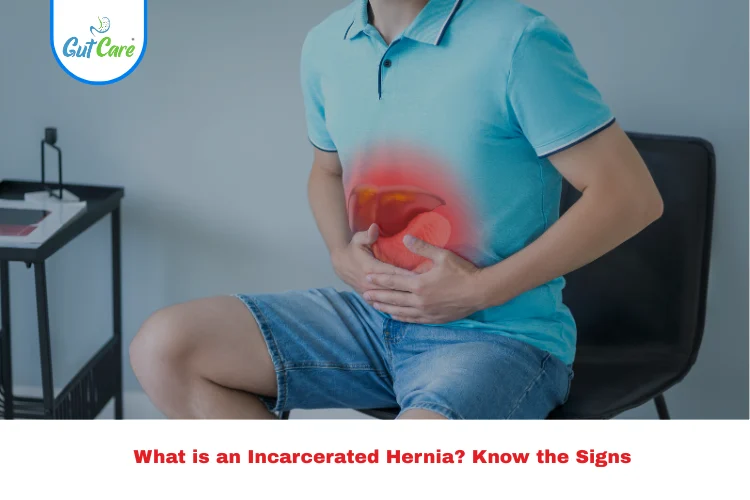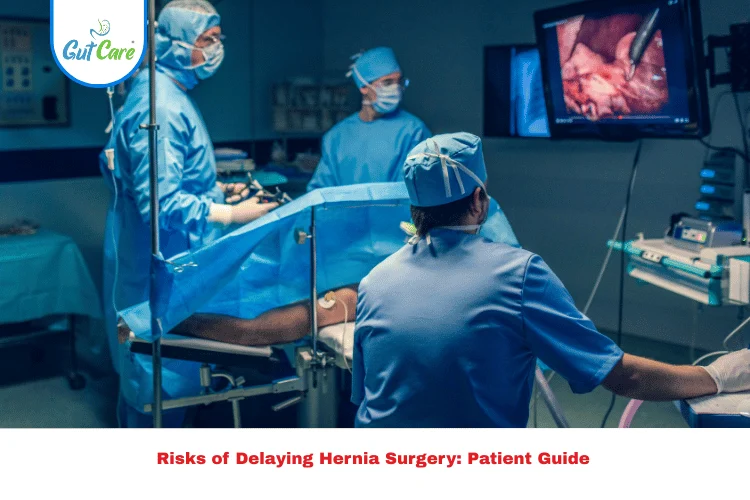At Gutcare Clinics in Bangalore, we are frequently attended to by patients concerned about smaller abnormal abdominal lumps or ongoing pain. One of these conditions that requires urgent care is an incarcerated hernia. The understanding of the condition, its effects and causes is germane to avoiding complications and appropriate management.
An incarcerated hernia happens when a piece of intestine or abdominal tissue is entrapped in the herniated sac and cannot return to its original position in the abdomen. These hernias are more serious than reducible hernias which can be pushed back, and usually painful.
Incarcerated Hernia Meaning
Incarcerated hernia meaning refers to a hernia that is stuck externally to the abdominal wall and can’t be reduced by hand. The entrapment may disrupt blood flow and cause serious repercussions if neglected. This is not to be confused with strangulated hernia which is immediately a medical emergency.
Incarcerated vs Strangulated Hernia
Understanding the difference between incarcerated vs strangulated hernia can help you recognize warning signs early:
Incarcerated Hernia:
- Cannot be pushed back into the abdomen
- Causes pain and discomfort
- Blood supply to the strangulated tissue may be intact
Strangulated Hernia:
- Blood supply has been cut off to the tissue that is trapped
- Can cause intense pain, nausea and vomiting
- Requires urgent surgery
If you notice intense pain, redness, or vomiting along with a bulge, it is crucial to consult a hernia specialist, like Dr. Yuvrajsingh Gehlot at Gutcare Clinics, Bangalore.
Causes of an Incarcerated Hernia
There are several risk factors :
Weak abdominal muscles: If congenital defects, combined with previous surgery leave scars, it is more likely that they will be more susceptible to being incarcerated.
Heavy lifting: The axial force of the lift can extrude abdominal tissue through the weak area of the wall.
Chronic cough or constipation: Continuous external pressure can risk incarceration.
Obesity: Excess weight can contribute to abdominal wall stress.
Ultimately, lifestyle choices, and delayed treatment of a small hernia can risk incarceration.
Incarcerated Hernia Symptoms
Awareness of incarcerated hernia signs and symptoms early is essential to avoid complications:
- A bulge, which is firm and painful, that will not reduce
- Nausea or vomiting
- Swelling or tenderness at the hernia site
- Fever (with severe incarceration)
- Constipation or not being able to pass gas
If experiencing any of these symptoms, I recommend seeing a hernia specialist if they do not resolve.
Diagnosis and Treatment
Diagnosis usually entails a physical examination, along with diagnostic tests such as ultrasound or a CT scan. Early diagnosis means the treatment can be done before complications develop.
Some possible treatments are:
Manual Reduction: Only done by a medical doctor if the hernia is not strangulated
Surgical Repair: This is the definitive treatment needed for most incarcerated hernias, ensuring that the tissue remains free and that the abdominal wall is strengthened
Seeing an experienced hernia specialist, such as Dr. Yuvrajsingh Gehlot at Gutcare Clinics is the best option, to ensure the procedural safety, and reduce the risk of recurrence.
Importance of Medical Consultation
Even with mild pain, an incarcerated hernia should not be neglected. Delaying treatment can lead to strangulation, which could be fatal. Seeking medical assistance will help to:
- Confirm the diagnosis
- Prevent complications
- Plan a surgical or non-surgical path forward in the best possible way.
Remedies and Prevention
Although surgery is typically unavoidable, certain strategies could mitigate the risk of hernia incarceration. These include:
- Refraining from heavy lifting or straining
- Maintaining a healthy weight
- Prompt treatment of chronic cough and constipation
- Herniartrix exercise to strengthen abdominal muscle – done safely
Once a hernia has become incarcerated, these strategies are only supportive, and not curative. Surgery with a specialist in hernia repair is still preferred and is the gold standard of treatment.
Summary
An incarcerated hernia takes place when some of your abdominal tissue gets caught up and cannot return back to its normal position. Recognizing incarcerated hernia symptoms – painful, non-reducible bulges, nausea, or swelling – early is important.
If you live in Bangalore, Gutcare Clinics can provide you with a consultation with hernia specialist Dr. Yuvrajsingh Gehlot, ensuring you get the treatment you need in a timely manner. Do not ever live with bulges or persistent pain – act early.
FAQs
1. What is an incarcerated hernia?
An incarcerated hernia is one that is stuck, outside the abdominal wall, and cannot be returned. It may be symptomatic (pain and swelling) and needs to be evaluated like any other acute issue.
2. Difference between an incarcerated hernia and a strangulated hernia?
An incarcerated hernia will be stuck, but blood supply may still be intact. A strangulated hernia will have a compromised blood supply and will have severe pain with signs of sepsis (e.g. fever, nausea).
3. What are symptoms of an incarcerated hernia?
Symptoms include a firm, painful bulge; nausea; swelling; tenderness; and sometimes constipation. Immediate identification of the incarcerated hernia will help prevent possible complications.
4. Who is a good hernia specialist in Bangalore?
Dr. Yuvrajsingh Gehlot at Gutcare Clinics is a trained hernia specialist and experts in the diagnosis and treatment of incarcerated hernias.
5. Can lifestyle changes help prevent an incarcerated hernia?
Life changes like avoiding heavy lifting, losing weight, and treating constipation may help prevent the chance of ever developing an incarcerated hernia, however, surgical repair is usually needed if an incarcerated hernia is present.




